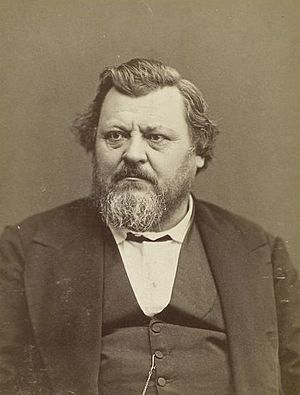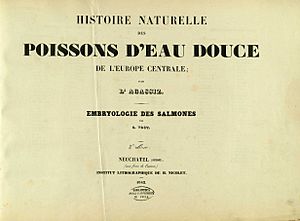Carl Vogt facts for kids
Quick facts for kids
Carl Vogt
|
|
|---|---|

Vogt c. 1870
|
|
| Born | 5 July 1817 |
| Died | May 5, 1895 (aged 77) Geneva, Switzerland
|
| Nationality | German–Swiss |
| Education | University of Giessen University of Bern (M.D., 1839) |
| Era | 19th-century philosophy |
| Region | Western philosophy |
| School | German materialism |
| Institutions | University of Giessen University of Geneva |
|
Main interests
|
Philosophy of science, political philosophy |
|
Notable ideas
|
Polygenism |
|
Influences
|
|
|
Influenced
|
|
August Christoph Carl Vogt (born July 5, 1817 – died May 5, 1895) was a German scientist, philosopher, and politician. He was also good at explaining science to the public. Later in his life, he moved to Switzerland.
Vogt wrote many important books about animals (zoology), rocks and Earth's history (geology), and how living things work (physiology). He was involved in politics throughout his life. He was part of the German Frankfurt Parliament during the revolutions of 1848–49. He also worked in Swiss politics later on.
Contents
Early Life and Education

Carl Vogt was born in Giessen, Germany. His father, Philipp Friedrich Wilhelm Vogt, was a professor of medicine.
From 1833 to 1836, Carl studied medicine at the University of Giessen. He then continued his studies in Berne, Switzerland. He earned his PhD in 1839. After that, he worked with a famous scientist named Louis Agassiz in Neuchâtel.
Scientific Career
In 1847, Vogt became a professor of zoology at the University of Giessen. Later, in 1852, he became a professor of geology and zoology at the University of Geneva in Switzerland.
His early scientific work focused on animals. He wrote about amphibians, reptiles, and sea creatures like mollusks and crustaceans. He also studied animals living in the Mediterranean Sea.
In 1842, while working with Louis Agassiz, Vogt made an important discovery. He found out about a process called apoptosis. This is when cells in the body are programmed to die. He observed this while studying how tadpoles of the midwife toad grow.
Carl Vogt supported Charles Darwin's theory of evolution. Darwin even mentioned Vogt's support in his book The Descent of Man.
Vogt believed in scientific materialism. This idea suggests that everything can be explained by matter and energy. He also believed in atheism, which means not believing in a god. He often debated these ideas with other scientists and thinkers.
Vogt held some very controversial views about human races. He believed that different human races evolved separately, not from a single origin. He wrote about what he called "two extreme human types," comparing different races. He claimed the differences between them were very large. Today, these ideas are considered racist and are not supported by science.
In 1869, Carl Vogt was chosen to be a member of the American Philosophical Society. He passed away in Geneva when he was 77 years old.
Political Involvement
Carl Vogt was very active in German politics. He was a representative for the left-wing group in the Frankfurt Parliament. This was an important assembly during the 1848 revolutions in Germany.
Vogt also had disagreements with other important political thinkers. For example, Karl Marx wrote a book called Herr Vogt (Mister Vogt) in 1860. In this book, Marx strongly criticized Carl Vogt.
Years later, in 1870, some old government papers were found in France. These papers seemed to show that Carl Vogt had received money from the French Emperor in 1859. This suggested he might have been working as a secret agent for the French government.
This news caused a big stir. Friedrich Engels, another famous Marxist, wrote about it. He claimed that Carl Vogt was indeed the person mentioned in the papers. This accusation became well-known among Marxists and historians studying Marx.
Honors and Modern Views
The city of Geneva, Switzerland, named a street after Carl Vogt, called Boulevard Carl-Vogt. They also put up a statue of him in front of a building at the University of Geneva.
However, in September 2022, the university decided to change the name of a building named after Carl Vogt. They made this decision because of his racist and sexist ideas. This shows how his controversial views are seen today.
Works
- An English version of his book Lectures on Man: his Place in Creation and in the History of the Earth was published in 1864.
See also
 In Spanish: Carl Vogt para niños
In Spanish: Carl Vogt para niños
 | Valerie Thomas |
 | Frederick McKinley Jones |
 | George Edward Alcorn Jr. |
 | Thomas Mensah |


